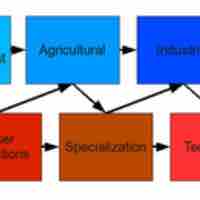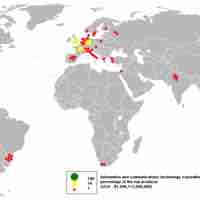Section 2
Sources of Social Change
By Boundless
Social movement theories seek to explain how social movements form and develop.

Social change is influenced by random as well as systematic factors, such as government, available resources, and natural environment.

The Four Social Revolutions refer to the identification of social change through modes of subsistence.
Gemeinschaft describes groups in which the community takes precedence over the individual; gesellschaft prioritizes the individual.
Sociologists Weber, Marx and Durkheim envisioned different impacts the Industrial Revolution would have on both the individual and society.

Over time, the concept of culture has transformed into a more inclusive concept.
Social cycle theories argue that historical events and the different stages of society generally go through recurring cycles.

William F. Ogburn's theory suggests that technology is the primary engine of progress.